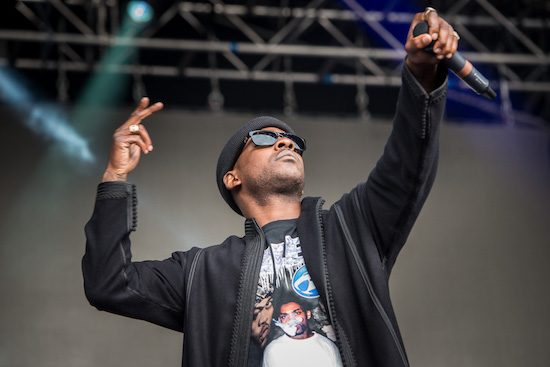All storms have a sting in the tail, and the one that hit Field Day during Anna Meredith’s set on the Saturday afternoon was a particularly cruel one, dropping grape-sized sploshes over the huge crowd waiting for Skepta on The Quietus Eat Your Own Ears main stage. It was about this time that, looking around at this resilient, cheery, mixed bunch of Londoners that I realised that when I went to the first Field Day, in 2007, most of these people were at primary school. Stop now! Let me put my pipe away, and anyway slippers would last five minutes in this oomska. Credit is once again due to the festival for avoiding a muddy rut and getting stuck booking nostalgia acts or classic album re-runs for the ageing: Field Day is the place where many of the Quietus’ interests meet, with stunning set this year from favourites like Mbongwana Star, Holly Herndon, Fat White Family, PJ Harvey, and Anna Meredith.
After a decade of being pretty much the most forward-thinking musical form on the planet, it’s about time grime also got a look in, especially given its roots just down Roman Road from Victoria Park in Bow. The rain has done nothing to dampen expectation for this set, frustratingly early in the day due to another booking in Brighton the same evening, though it seems to have put a bit of a crackle in the mixer – no matter. Many of a certain age a little older than myself like to grouch that pop music has lost its bite, that it has become afraid to be weird: if only they were made to watch Skepta in full flow. One of the great hallmarks of British pop, from David Bowie to Kate Bush or the Pet Shop Boys, has been to force hard or underground sounds into the mainstream, to see no reason why oddness, politics and a sense of place can’t have a powerful presence in the charts. Skepta is the latest in this fine line, banging out ‘That’s Not Me’, ‘Crime Riddim’ and ‘Shutdown’ to singalongs in a set that really catches fire when Jammer appears onstage in a high energy blur of dreads and a white towel.
If PJ Harvey’s closing set on the Sunday night, backed by an oppressive, distant thunderstorm, is a state of the nation comment on these difficult times and England’s troubled place in the world, Skepta is a fascinating, youthful counterpoint. His lyrics of ginger beer and postcodes, "back door key and HSBC" more English than the slightly odd cod village fete keeping calm and carrying on in the middle of the Field Day site. "Staying far from the devil in the red dress / Far from the pagans" Skepta raps in ‘Konnichiwa’. As the rain stops and sun breaks cover over the Field Day, I’m not so sure. Cheers for ten years of Field Day, here’s to another ten more with The Quietus’ reviewing crew’s round-up of our highlights of the two days. — Luke Turner
14:25 – Anna Meredith, Moth Club Stage
Coinciding with a well timed and thoroughly brutal rain shower, Anna Meredith brought those seeking refuge from the downpour into an uplifting, multi-instrumental performance of her debut, Varmints. This was a translation-project in itself; in the studio, it would have been easier to piece together Varmints, and her ease in being able to interpret this live was impressive. With unique experience as a BBC Scotland Symphony Orchestra composer behind her, she leads the band with the confidence of someone who has pre-envisioned the role of every instrument in relation to her work’s whole. Despite the pop structures of her material Meredith is never too far removed from her classical roots, sharing the stage with a tuba player and cellist. Live, Meredith’s debut is less subdued, melancholic, focused; it is triumphant, explorative. Mistakes are accepted and absorbed into the rolling noise. Ditching the ticking drum-machine in favour of a live drummer adds a festival-friendly penchant for expressive drum fills and dramatic build-ups. Easy comparisons can be made here between this and Broken Social Scene and the orchestral pop of the last decade. Though Meredith is trying to do a lot more than re-create this sound, completing their journey through ‘The Vapours’, becoming live a startling and inventive exploration of cello and guitar rhythms. — Lottie Brazier
17:20 – Deerhunter, The Quietus / Eat Your Own Ears Stage
There’s a sense of mounting anticipation during the frantic changeover ahead of Deerhunter. Previous acts on the stage had suffered a few technical issues and one wonders if the logistics of coordinating such a varied line-up in such a short time was causing any deficiencies in quality. When frontman Bradford Cox walks on stage though, there’s suddenly a lull in the recent heavy downpour and Cox brings with him a contrastingly sunny disposition and a brazen, playful wave. It’s been well established that a Deerhunter set’s flow can sometimes be susceptible to Cox’s mood, so it’s reassuring to see him dance down onto the platform in front of the stage to summon up the engagement and energy of an already appreciative mid-afternoon audience.
Alongside Cox’s towering swagger is the rock solid rhythm section of bassist Josh McKay and drummer Moses Archuleta, both of whom really prop up the arrangements of certain tunes, showcasing the band’s increasing propensity for powerful groove, as on the brilliant set closer ‘Snakeskin’. It does work to one song’s detriment, however. The effectively anodyne production and clinical feel of ‘Living My Life’ from last year’s excellent Fading Frontier, a song of resolved domesticity, seems incongruous with its new ‘Young Americans’-style dressing, but it serves as the only questionable point of the set. Ebbing and flowing from unhinged and erratic psychedelia to jangled and melodic counterpoint, their performance tears through a wide range of their discography. For me, though, the highlight is guitarist Lockett Pundt taking on lead vocals and guiding the band through ‘Desire Lines’, a song that I feel is so clearly one of the greatest written in the last decade. The brilliance of it lies in its initial stark simplicity which is later counterbalanced by an intensely cyclical coda, one of which today is placed several notches above its recorded version. One of the truly life affirming moments of the festival. — William Doyle
17:55 – Dilly Dally, Shacklewell Arms Stage
…may be what was written on the poster, but ruthless concision is what was delivered. Call it a laugh in the face of advertising standards, a non-Ronseal approach, a direct contradiction of their name, but this was a zero frills – and excellent, at that – show. Sure, the band’ve come all the way from Toronto, but that’s no reason to tarry; there’s a tentful of people clad in sun-dried grot to blast.
To be fair, their singer Katie Monks could have done that on her own. She switches between guttural verse intonations to the kind of shriek that sounds clear above the chorus maelstrom with seeming ease, even if it sounds like wrenching at viscera, her vocal cords presumably absolutely shredded by the time they close with ‘Desire’. It’s maybe no surprise that ‘Purple Rage’ shines brightest, its spiralling arpeggios and mammoth chords sounding like a ragged offcut from Siamese Dream, but even better is how well their version of Drake’s ‘Know Yourself’, lacerated with feedback and jumping from quiet-LOUD loud, works as a lead-in. — Laurie Tuffrey
17:15 – Kelela, Resident Advisor Stage
The crowd at the RA tent swells noticeably in anticipation for Kelela’s Saturday afternoon set coming off the back of the release of the Hallucinogen EP late last year, a statement which marked her signing to Warp Records.
Opting mostly for more impactful, festival-ready cuts from her releases thus far, she’s typically on form, a minimal stage set-up affording her the opportunity to make the necessary impression alone. Moving between material from her debut Cut 4 Me mixtape, including ‘Bank Head’, ‘Enemy’ and ‘Send Me Out’, maintaining the kind of pitch perfect vocals you would expect, it’s the more recent material that gets the biggest reception. ‘A Message’ is achingly graceful while the swagger of closer ‘Rewind’ – a track that if there was any justice in the world would have been a chart hit last year – ends it all on a high. While the RA tent doesn’t quite offer the intimacy of the last time I caught her live at Corsica Studios, it’s still a faultless performance from Kelela and an excellent taster of what could be expected from checking her out in a better-suited environment. — Christian Eede
18:55 – Girl Band, Shacklewell
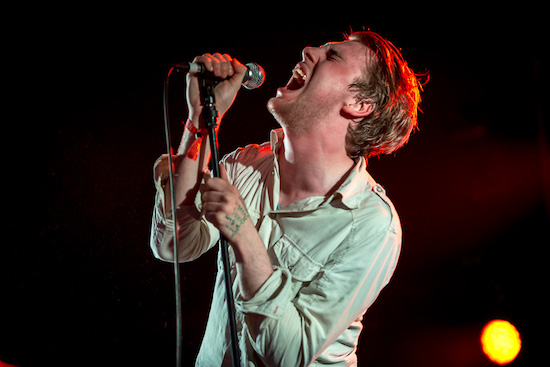
The feeling as Girl Band take to the Shacklewell Arms stage this year is one of a comeback of sorts. With an unfortunate hiatus taken not long after the release of last year’s debut album Holding Hands With Jamie, one wonders if some momentum was damaged in the fallout. Having seen the group a few times over the years, this break perhaps came as no surprise. The worrying degree to which frontman Dara Kiely would push himself to his vocal and emotional limits may have made for impressive shows and indisputable reputation but it seemed unsustainable at that level, and one worries for a young band that show so much promise making a misstep so early on. This time, though, it seems Kiely has redefined his capacity, exhibiting at least some semblance of restraint, albeit in a relative sense. That Girl Band’s performance loses no intensity due to this – that it seems stronger, even – is a testament to how integral every member’s contribution is.
It’s an absolutely electrifying performance and as savage as it ever was: right from the bold opening of their signature Blawan cover ‘Why They Hide Their Bodies Under My Garage’ through the highlights of their album, there’s barely a gap for breath. One of the most remarkable things about this band is that through the complete and utter eschewal of harmony, leaving all chords to be implied, there remains a sonic hole left to fill in which each member tries their hand at the perfect jagged puzzle piece. This works well on record but it’s on stage where this colourful struggle is best displayed. Today I’m mostly struck by guitarist Alan Duggan as someone who really understands the sonic potential of their instrument, and seems to be able to harness it in completely ludicrous ways. It ends up acting as a tractor beam to me as I’m pulled into the ferocity of the audience, only to re-emerge later as a much sweatier individual. — William Doyle
19:30 – Gold Panda, Crack Stage
By now, the difference between park and lake is less marked than one would hope. A walk across the site from Girl Band, delivering a pummelling to the people on the tent’s sodden periphery, takes in Yeasayer valiantly delivering ‘Ambling Alp’ to a main-stage crowd dancing on what is essentially a scale model of the Fens. The swarming orange light emerging from the Crack tent, then, glows that bit warmer. Within, Gold Panda is mid-set, lending a harder edge to his airy and melodic electronica. Since his last appearance at the festival, in 2012, it feels like Derwin Schlecker has more fully honed his vision for the live side of his project, making music that nods as much to the dancefloor as it does to headphones; the Japan-inspired chimes and deftly-constructed textures remain, but now they share space with some pleasingly heavy-duty bass kicks. Nowhere is this better embodied than on the kinetic and gently pumping ‘Your Good Times Are Just Beginning’, a fitting, both in name and sound, closer. — Laurie Tuffrey
20:40 – Dean Blunt, Moth Club
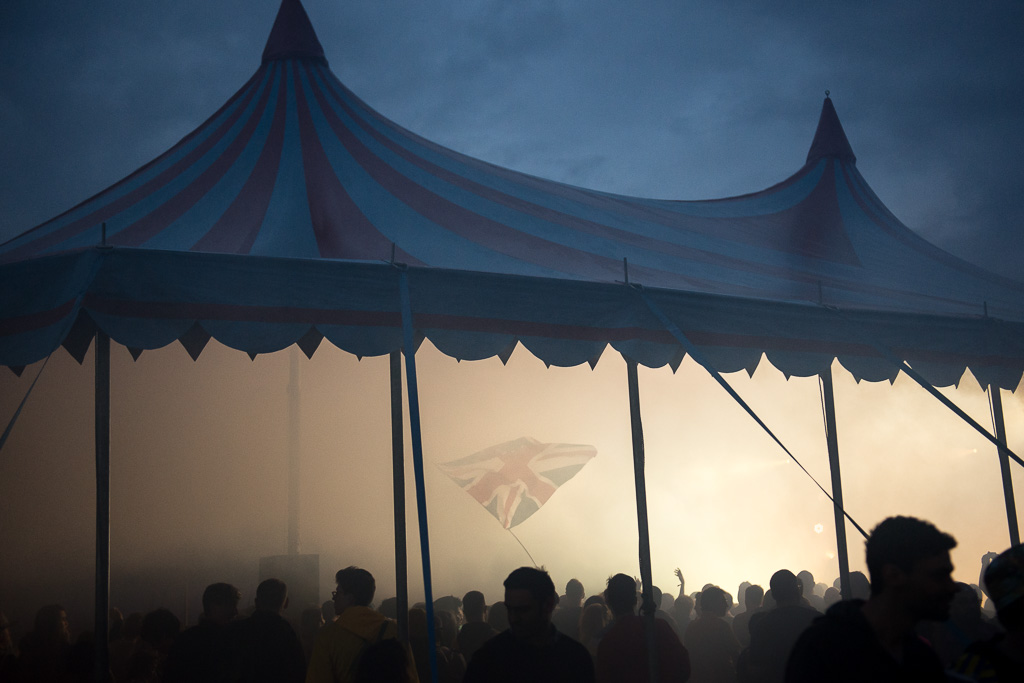
Without ever letting expectations form about him, Dean Blunt evades genre and creates mood through any instrumentation or sampling he sees fit. Or, via rapping, as is the case on his most recent album as Babyfather. Blunt also takes an interest in contemporary art, sometimes for what seems like the purpose of entertaining himself: he once tricked punters into attending an ‘exhibition’ which featured a single framed stock photo.
As it so happens, Blunt also likes to mess with his music fans. In the transition from muggy evening into dusk, a wall of theatrical fog began to break up the audience; Blunt’s own presence on stage became only as clear as his voice and the traced profile of his face. Every so often, a man carrying a Union Jack flag would cut through the scrambled crowd. It worked as an unexpected disruption to the atmosphere of Blunt’s tent; tight with people but all of which dancing and moving with a self-absorbed emotional distance, numb and hedonistic. It was hard to tell at first if the flag was even part of the performance. Were we, as the crowd, supposed to be militantly rallying behind it or to be repelled by its presence? Or in an entirely different and more generous move, was it Blunt stretching out in a felt cultural unity with his audience, as a kind of urban patriotism with those who were partying? Or maybe Blunt just felt like winding up the British public, saddled with ingrained repulsion to their own flag.
Whatever the reason behind the Union Jack spectacle, Blunt’s rhymes were direct and first-personal, providing a strange harbourage to the desperation of those pounded into concrete by modern politics. There is tired anger in his voice, as though he has to reiterate the same point before what he says has any significance to the ‘right people’. — Lottie Brazier
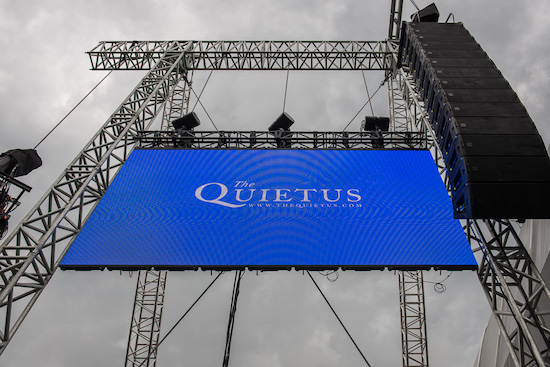
20:30 – Holly Herndon, Resident Advisor Stage
Sandwiched rather incongruously between a DJ set from Mount Kimbie and a closing slot for Bicep, Holly Herndon’s Saturday evening performance in the RA tent sees her bring Platform to Victoria Park flanked by now established on-stage collaborators Mat Dryhurst and Colin Self.
Taking to the stage at 8.30pm, it’s an unenviable task coinciding with England’s first Euro 2016 performance (the match was screened on site according to organisers), but one that the trio are certainly aware of with Dryhurst’s live text visuals making joke references to members of the squad making out on the pitch. Self and Herndon share vocals for much of the show recreating ‘Interference’’s vocal acrobatics live as Dryhurst manipulates live visuals of technology and various desk detritus in the background.
Taking in other material from Platform and past work, it’s a distinctly more danceable set than one might expect from Herndon on record and, as with the discussion that preceded and followed the release of the record, sees her continuing to provide a platform for the work of others as well as herself. Colin Self is an integral part of the show, leading vocals on a number of the tracks and, at one point, taking centre stage as he throws himself across the stage in a plethora of floating blond hair and stunning vogue-esque movements. Once again, Herndon proves that Platform is just as much about having fun as it is venturing important concepts. — Christian Eede
13:40 – Empress Of, Verity Stage
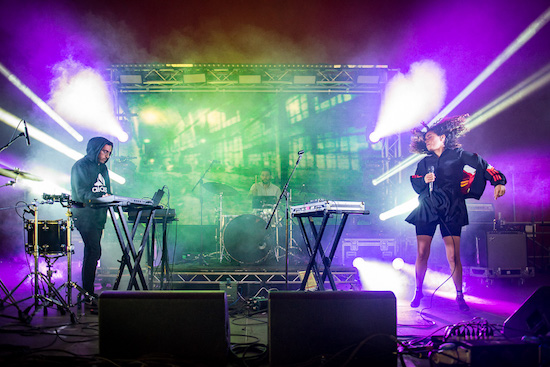
Field Day have done well over the last few years to extend over to a two-day event and partition the feel and audience. The Saturday mostly acts as the colossal contemporary blow-out: all enthusiastic youth with pupils wider than the sun, surrendering themselves to some of the finest popular electronic music, and the Sunday retracting into a more reserved but assured dive into songcraft and six-stringed heritage.
This does however mean that a few scheduling mishaps arrive in the shape of more Saturday-centric acts not thriving in their bids to win over a hungover or less inclined audience. Empress Of’s set very nearly falls into this category, and as Lorely Rodriguez and her two touring accompanists take to the stage, it feels like there’s quite the task ahead to engage with the slowly growing crowd of Sunday lunchtime arrivals. Fortunately for her though, there are very few other acts who would be playing at this time of day that have some of the finest hook-heavy pop songs written in the last few years. As the audience grows and we’re shuffled through the peaks of last year’s debut LP Me, the energy starts to swirl throughout the tent, helped in part by Rodriguez’s relentless exuberance.
She may appear out of breath at points, and some of her soaring head voice is converted to a reliable falsetto fall back, but the accuracy of pitch and reserve of enthusiasm keeps the momentum from shattering. It’s something I consider often since the release Me, but Empress Of really should be saturating mainstream radio waves and playing much later on to already warmed-up crowds when the material is this strong, but I have to remind myself that it’s early doors, not only for this festival, but for the eventual, inevitable breakthrough of one of the best melodic pop minds available to us. — William Doyle
14:30 – Steve Mason, Return Of the Rural
The years since the demise of The Beta Band have seen Steve Mason has become something of dependable and stalwart warhorse. There burns a fire in his belly that’s sadly lacking in so many artists and maybe it’s age or romanticism on the part of this writer but the cockles are genuinely warmed when Mason declares, “We have the power! We just forgot to use it!”
Meet The Humans has proved to be his finest release in many a long while and the selections here today bear testament to his skills as both songwriter and performer. ‘Alive’ is a real stand out, largely because it encapsulates all that’s good about Mason and his oeuvre; those lolloping basslines that lock into the shuffling drums, those acoustic strums and Mason’s smooth as caramel voice. That said, there does remain the slightest of nagging doubts that perhaps he needs to move out of that comfort zone lest he becomes that dependable and stalwart warhorse who is always to be found in the mid-afternoon slot at festivals. But that’s another worry for another day because this is the groove to ease in a Sunday afternoon. — Julian Marszalek
14:45 – Cass McCombs, Shacklewell
You know it’s Sunday at Field Day when a bass solo feels like a perfectly acceptable thing to happen. The day of forgiveness for musical sin is upon us. Cass McCombs seems to have a knack for knowing some very fine musicians and indeed all of the band are given their centre-stage moment here. Although it quite often steps dangerously close to noodle territory, luckily everyone seems to be enjoying themselves and very little seems to be of a self-congratulatory wank-a-thon nature, especially as we’re always safely returned from our odyssey back to the refuge of the song.
And Cass’s songs are refuges. I often find myself crawling back into them, to bask in their warmth, to sit comfortably there for a while. There’s a very relaxed and self-assured way that Cass carries himself on stage, and I wonder if it’s down to this comfortable niche he’s carved himself. Melodically, harmonically, lyrically every song feels as structurally sound as a house, and not in a sense that it floats by without demanding your attention – not as aural wallpaper – but something that is very calm about what it is. Cass juggles deep longing and humour almost too easily, and leaves you laughing-while-crying quite regularly. It’s remarkable that, even when playing completely brand new songs at a festival, these qualities are still so apparent, ‘Opposite House’ sounding as fondly familiar as fan-favourite ‘Dreams-Come-True-Girl’. But so it is to homecoming that we’re brought by ‘County Line’, a bona fide classic, and one that as soon as the first chord rings out, the collective glow of appreciation is felt and shared among everyone. It drifts slowly into its new-homes never-ending, to it’s still-the-same pain and so, we too, drift with it. — William Doyle
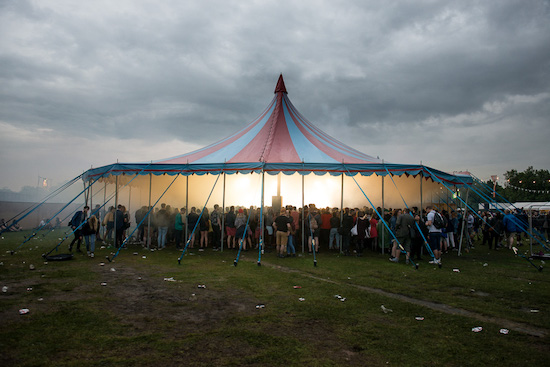
15:10 – Molly Nilsson, Moth Club
An icy drum beat and blasts of calypso keys emanate from the stage that Molly Nilsson is performing on, in a tent busting at the seams with people. It’s a rare skill for a solo performer who sings to a backing track live to be captivating: John Maus literally hits himself over the head while performing to help hold his audience’s attention. But Nilsson, on stage today, has a certain intriguing combination of aura and delivery that is somehow detached whilst also embracing. It takes a couple of songs for the audience to warm to this persona – but they seem to do so just as a rare burst of sunshine spills through the edges of the tent. Nilsson dedicates her song ‘Lovers or Losers’ to the upcoming EU referendum – pondering which the UK will be, depending on the outcome. (And now we know the answer.
She finishes her set with ‘1995’ in which the audience sing along to the refrain ‘I’ll remember ‘95’ – although it doesn’t seem like half the audience are old enough to have memories from then. Nilsson tells the crowd on more than one occasion that today is strange for her as she doesn’t usually play festivals – but you can’t tell from the way she has had this stage enthralled throughout her set. — Glen Mcleod
16:00 – The Thurston Moore Group, The Quietus/Eat Your Own Ears
Get this guy a tone marrow transplant. Thurston Moore and his band The Thurston Moore Group really brought the blaze to the big stage on Sunday afternoon. With a pair of emeritus professors of Jazzmastery up front, this is one two-pronged attack that needs to be considered live and dangerous. Thurston definitely knows his way around a rosewood fingerboard after his time in the Sonic Youths and it wasn’t long before him and his buddy James “Dreadwards” Sedwards were raging at the 17th fret. With Deb Googe from The My Bloody Valentine holding things down with some seismic bass from a sweet twin-cab rig, these two axemen of the arockalypse were throwing out some (un)natural harmonics and gnarly noise (no tuning pedals for these guys 😉 ), and even if there were some feedback issues, cuts from the band’s latest CD, The Best Day, sounded totally badass. If 45 minutes in the tonezone wasn’t enough (and I know I needed a 330ml cold one right after slaytime was over), check out Thurston’s Gary Moore-era Thin Lizzy tribute band, Thurstin’ For Moore, when they hit the road later this summer. — Reed Fonga
16:00 – Fat White Family, Shacklewell Arms
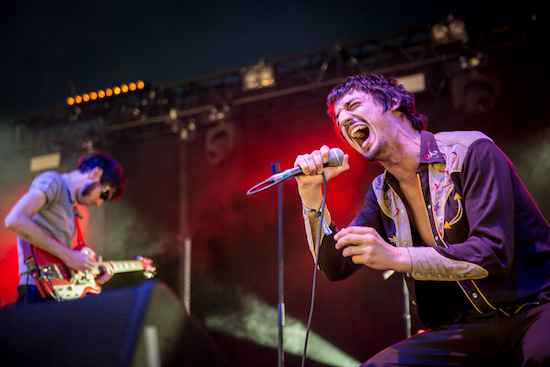
As expected, Fat White Family managed to incorporate a sizeable amount of shock into what was otherwise a placid Sunday afternoon. By mid-set, Saul Adamczewski had one gratuitous hand down his pants, looking with dazed pride at the crowd that he had amassed. But like cinematic gore in a slasher horror, any outrageous behaviour from the Fat Whites frontman is somewhat softened in your expectance of it. But this is no bad thing; the performance in itself was thoroughly tongue-in-cheek; their presence was Magazine-esque black-and-red Top of the Pops post-punk; crumpled, oversized jackets and dagger-collar shirts.
From where I was standing, the bass lacked punch and higher frequencies lacked clarity; a complaint that I heard being batted around the audiences over the course of the weekend. The Fat Whites’ groove seemed to get lost in the muddiness somewhat, but that was no fault of the band themselves. But, regardless, a relishable energy was now hatching between Fat White Family and the audience who had absorbed their theatrics. This dissipated somewhat as a man in a wheelchair was pulled out from the crowd, seemingly against his own will, and taken into a ‘safe area’ which also made up the press pit. It was hard to pass any final judgement over the decision of festival security to take him away from the crowd, but it did remind us of the fact that, despite any sense of chaos the band were creating, it was ultimately controlled. — Lottie Brazier
17:30 – Brian Jonestown Massacre, The Quietus/Eat Your Own Ears
It’s a small and fleeting thing, a blink-and-you’ll-miss-it moment of beauty that occurs around the mid-point of Brian Jonestown Massacre’s tea time set on The Quietus stage but there, just for a few seconds directly in front of the stage, a rainbow has appeared. It hangs there all too briefly as the light drops of rain falling before the stage catch the sun that begins to peek from behind the clouds, pointing at the pot of gold making music on the stage.
Like a fine wine, Brian Jonestown Massacre have become better with age. It can be argued that their focus was always on the music, albeit with any number of distractions littering their journey, but here, even in broad daylight, the languid grooves emanating from the stage may be laid back but they’re far from horizontal. ‘Anemone’, with its sun kissed demeanour, shuffling percussion and hazy blues licks, remains the quintessential BJM track but it’s hearing newer material such as ’Vad Hände Med Dem’ – here sung in English – that prompts the realisation of how far they’ve come and how far they still have to go before they’re spent. Praise the Lord and roll another number. — Julian Marszalek
18:00 – Mbongwana Star, Verity Stage
As Mbongwana Star take to the stage they encounter some technical issues, but rather than standing around while waiting for them to be fixed they delve into a bluesy jam to get the crowd in the mood. Problems resolved, they launch into their set and it becomes apparent that the electronic flourishes from debut album From Kinshasa today will be replaced with a more traditional guitar setup — which is not to say a more straightforward sound. Intricate guitar patterns swirl around the room sounding more like something played on finger piano than electric guitar, while a dub like bass bubbles underneath.
Although on record their songs have darker edges, they are not as apparent live, giving the set a joyous and uplifting feel. A few songs in they play ‘Shague’, and the whole tent is jumping, including the band: Singer Coco Ngambali is confined to a wheelchair yet is throwing shapes and putting more energy into his performance than most of the other artists we have seen today. This energy is infectious and has the sweaty, appreciative crowd dancing in equal measure. — Glen Mcleod
18:30 – Goat, Shacklewell Arms
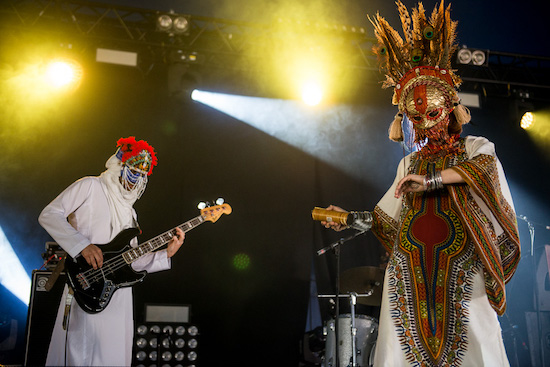
That you get more bang for your buck where Goat are concerned is always pretty much a given but their explosive set at the Shacklewell Arms tent not only raises their own lofty bar but also clears it with a verve, energy and exuberance that borders on the shamanic.
The Afrobeat rhythms that have transplanted themselves to northern Europe is the bedrock on which they base their campaign: these are sounds and pulses that bypass the head, do not stop to collect £200 and aim straight for the hips. This is a band that knows who to satisfy those primal urges, that understand the need of inducing trance-like states through repetitious and vigourous dancing.
Yet be that as it may, it’s when Goat begin to go off-road that things really take off. Witness ‘Run To Your Mama’ which takes flight thanks to a genuinely thrilling, wigged out and adventurous guitar workout that sends the assembled throng into a paroxysms of joy and wild abandon. By the end of their allotted time, wide smiles are the order of the day as spent and satiated fans tumble from the tent as they attempt to make sense of the orgasmic joy they’ve just experienced. — Julian Marszalek
19:00 – The Avalanches, Return of the Rural Stage
The Avalanches came to fame in 2000 with the album Since I left You, a patchwork masterpiece in which they spliced together thousands of samples mostly from rare and obscure records, to create their sound. And it’s with that in mind that the fact that they’re playing today as a pair of DJ’s rather than a full live band isn’t really that surprising – but the selection of music that unfolds throughout their set is. Samples from Since I Left You are cut with pop anthems like David Bowie’s ‘Let’s Dance’ or indie classics like Television’s ‘Marquee Moon’. This is the band who apparently divided their hometown Melbourne into a grid of record stores and charity shops that they could pillage for hard to find records – so choosing to play an obvious set that wouldn’t sound out of place at a wedding is a strange way to comeback live after an almost 15 year absence.
The crowd in the packed tent are dancing but not with much spirit, one person pushes their way into the throng and after listening for a few minutes asks me with a confused look if this is the Avalanches, before exiting the tent. Towards the end of their set the pair tease the crowd with the horse sample from the start of one of their most popular songs ‘Frontier Psychiatrist’ which gets a huge response from the crowd: they play a couple of minutes of the track before swiftly moving on to something else forgettable. It seems the band are much better at fuelling anticipation than delivering on it. — Glen Mcleod
20:30 – AIR, Return of the Rural
It was impossible to even get close to the front of the stage for AIR, though the sound travelled well. From what could be seen, the duo were playing in front of an installation comprised of soft-edged white cubes, clinical like a pop-art hospital or snapshot into a Japanese capsule hotel.
AIR approach us, the audience, with a degree of subtlety, testing us out on some lounge instrumentals. Without prior warning, they begin a crisp and bizarrely exact version of ‘Cherry Blossom Girl’. With this live performance of the track being so close to the recorded version on Talkie Walkie, it is hard to tell whether the original track is just simple for them to play, or whether they have worked excessively on the fine details of re-creating this live.
As though sealed in 2004, AIR are playing up to what they are best known for, rather than becoming more club-orientated as you might imagine from an electronica duo hoping to reinstate their presence on a modern stage. They know that their original material impresses, and it’s an interesting statement in itself for them to stick to the overly familiar; AIR are now as part of the melodic scenery as the ‘elevator music’ that they gave artistic credibility to. — Lottie Brazier
21:00 – PJ Harvey, The Quietus/Eat Your Own Ears
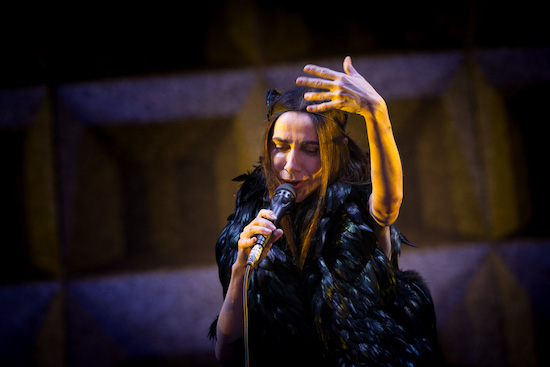
As befits an artist who has immersed herself in the study of war, PJ Harvey makes her live return to these shores in force, brandishing her saxophone, her band bearing military snares and a huge marching bass drum. Chain of Keys begins things with an intent, rolling swing, giving way to the shuddering shocks of guitar that open The Ministry of Defence, where Harvey’s voice takes on an evil, velvety tone that hasn’t been heard in quite some time. She bobs in front of the stage’s backdrop of shadowed, recessed panels as she sings the song’s plaintive litany of rubbish: “broken glass, a white jawbone / Syringes, razors, a plastic spoon… this is how the world will end”, and her band’s heavy panting adds an unsettling edge.
It’s no surprise that The Hope Six Demolition Project sounds better live: nearly everything does. But it’s not just the usual boost of atmosphere and rough, unpredictable live energy that these songs gain. They come to life: tracks that could seem distant are filled in, filled out, by Harvey’s powerful presence. She roams, shimmies and poses, her hands imploring, framing, pointing. The rippling black feathers of her costume, too, seem to indicate a halfway house between the mannered, head-dressed bird-of-battle she became for the Let England Shake shows, often spotlit and rigid, and the boa-ed, vengeful vamp of yore.
That hint of sex and humour and life, as well as all the misery and horror and death, gives a fascinating depth and uncanniness to her performance. The chilly, detached side to her falsetto is brought to good use on the disturbing singsong of A Line in the Sand, where an unidentified speaker from her war diaries trills “We got things wrong/ But I believe we also did some good”, while ‘Medicinals’ and Hope Six’s title track have a rousing, rambunctious energy. Less successful is The Orange Monkey, dedicated to photojournalist collaborator Seamus Murphy, an unremarkable song that doesn’t seem to have fully completed the transition from poem to lyric (it also appears in Murphy and Harvey’s book The Hollow of the Hand).
Then there’s the gorgeous trio of songs from Let England Shake at the centre of the setlist. The title track creeps in with its skeletal jangle, Harvey giving it a bit of the old Vampira kabuki, lunging low, spirit fingers atwitch. Circling birds are silhouetted in the summer evening air as she sings “I’ve seen flies swarming everyone” to the rousing handclaps of The Words That Maketh Murder. What a brilliantly ghost-at-the-feast presence she is as a festival headliner these days; you don’t get many main-stage call-and-responses like The Glorious Land’s “the fruit is orphaned children”. ‘When Under Ether’ from White Chalk fits in wonderfully, floating in soft and high and lovely as a dream of peace or death, the refrain of “human kindness” like a hallucinatory impossibility after what’s come before.
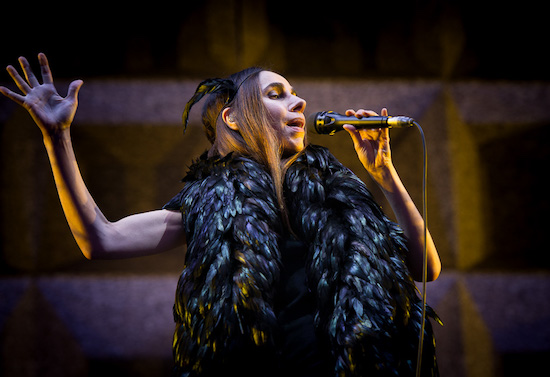
Hope doesn’t come easy, and neither does the right tone, when you’re writing about this sort of stuff. “All my words get swallowed”, sings Harvey, overwhelmed, on the heavy, doleful ‘Dollar, Dollar’, a song that deals with her struggle to express what she saw in Afghanistan and beyond. Her hands come to her face, covering her mouth to speak no evil. ‘The Wheel’ rolls in like thunder to her rescue, introducing a powerhouse closing section. ‘The Ministry of Social Affairs’ swaggers in with its saxy strut, the repetition of “that’s what they want… oh yeah… money, honey” descending into menace and madness. And then 50ft Queenie rockets in, unbelievably hard and fast and rough and loud, Harvey’s introductory “HEY!” levelling trees at the back of the park. ‘Down By The Water’ throbs with evil slink, and Harvey’s voice creaks dry and dusty and dormant on ‘To Bring You My Love’, contrasted with the sharp metallic ring of the guitars. Something slouches towards Bethlehem to be born, and she covers her eyes, to see no evil.
Anacostia offers, finally, a gentler sort of religious succour, borrowing the refrain of Wade in the Water, bathing wounds in organ thrum. “What will become of us?” Harvey asks plaintively, a question that hangs heavy in the face of the day’s awful news from Orlando. The song fades right down, so all you hear is handclaps and voices so low as to sound almost unamplified, before the stage blacks out. It’s a great ending.
But more is to come: a high point in ‘Working For The Man’, sounding deliciously dangerous to know and ‘A Perfect Day Elise’ in a heavy, bluesy, lean and mean guise, Parish banging away on that big marching drum as Harvey prowls like a sexy carrion crow. It’s a wonderful coda to a wonderful set, and so different from her last UK shows. The songs of The Hope Six Demolition Project, live, seem to have offered a bridge between the Let England Shake era and Harvey’s back catalogue, and ignited a fresh, wild spark that promises great things to come. — Emily Mackay

